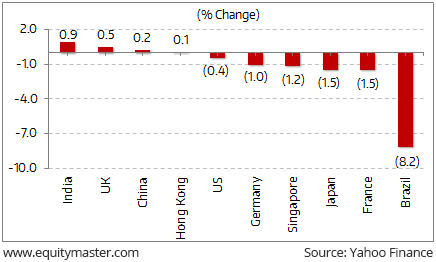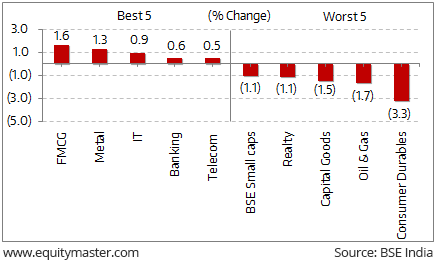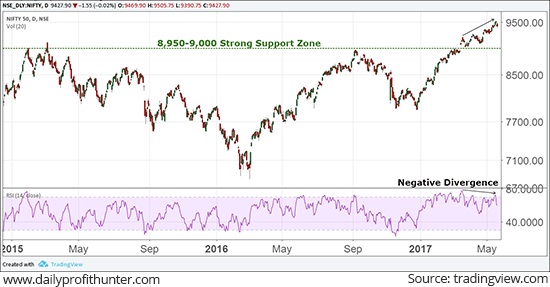Investment in securities market are subject to market risks. Read all the related documents carefully before investing
Grab Our Small Cap Recommendation
Service at a 60% Discount
- Home
- Todays Market
- Indian Stock Market News May 20, 2017
Brazilian Markets Plunge on Emerging Political Scandal Sat, 20 May RoundUp
Global financial markets ended the week on a mixed note. It has been one of the most eventful weeks in the recent times, with leading world equity markets scaling record highs and then plunging in one of the sharpest cross-asset routs in years.
Brazil's stock market, Bovespa, plunged more than 10% immediately after opening Thursday, wiping out almost all of its gains for the year. Brazil's currency, the real, also tanked 7% against the dollar, its worst day since the global financial crisis in 2008. The selloff came after new bribery allegations surfaced against Brazil's president, Michel Temer. The index and real tumbled as fresh accusations against Temer dampened the outlook for his structural reform plans. The Brazilian market closed the week down by 8.2%.
The US market remained choppy and closed in the negative territory. This was on the back of Trump's firing of FBI director James Comey and allegations he pressed Comey to stop investigating his former national security chief and other officials' alleged ties with Russia. Investors have been concerned the allegations could delay tax cuts and increased spending, pro-growth efforts touted by Trump during his election campaign. The US market closed the week down 0.4%.
Meanwhile, European indices closed on a weaker note. Germany's DAX was down by 1%, while France's CAC was down by 1.4%. The UK indices closed the week up by 0.5%,
In Asia, Japan's benchmark Nikkei 225 was down by 1.5%. Hong Kong's Hang Seng rose marginally by 0.1%.
Back home, the BSE Sensex and the NSE Nifty recorded their second straight weekly gains. The key Indian equity indices touched new intra-day highs during the week. FMCG counters buzzed following finalisation of GST rates for the bulk of the items. However, global volatility arising out of political developments in the US and emerging markets like Brazil held back the gains. The BSE-Sensex ended in green and was up 0.9%.
Key World Markets During the Week

On the sectoral indices front, FMCG sector and Metal sector stocks led the gainers this week. On the other hand, stocks from Consumer Durables, Oil & Gas, and Capital Goods sector witnessed maximum selling pressure.
BSE Indices During the Week

Now let us discuss some key economic and industry developments during the week gone by.
India Ratings and Research (Ind-Ra) in its latest report has said that the policy which is betting on higher spending on infrastructure and construction sector will give a boost to the struggling Indian steel industry cautioning that execution of provisions in the new steel policy will remain a key challenge for the government. Though the execution of provisions in the policy will remain a key challenge for the government and therefore to make the policy successful, timely implementation of various steps will be crucial along with ways to build demand leading to improvement in capacity utilisations of existing plants.
The report further said that steel demand should grow at a CAGR of around 7 -7.5% during the period against a CAGR of 3.5-4% over the last 5 year to meet the expected demand of 230 MT and to increase the steel capacity to 300 MT by 2030-31 would require extensive efforts towards increasing the availability of resources such as infrastructure, raw material and finance.
While accelerated spending by government in infrastructure, construction, railways and the defence sector will be the key to achieve the aggressive demand growth, Ind-Ra believes the expected growth in steel demand looks ambitious and may face hurdles like political instability, budget constraint and timely execution of projects. However, it has said that the capacity creation which requires capital expenditure of around Rs 10 trillion will lead to stretched credit metrics on a sustained basis for companies, due to the continuous capex undertaken, and expects that central public sector enterprises will be under pressure to build capacity for catering to any demand- supply gap after considering the capex by the private sector.
In news from the economic sector, after introducing revised macroeconomic indicators of Index of Industrial Production (IIP) and Wholesale Price Index (WPI) by changing the base year for data computation to 2011-12 from 2004-05, chief statistician TCA Anant has said that upcoming gross domestic product (GDP) numbers which are scheduled to release on May 31 will include the impact of revised data series for IIP & WPI.
Just Released: Multibagger Stocks Guide
(2017 Edition)
In this report, we reveal four proven strategies to picking multibagger stocks.
Well over a million copies of this report have already been claimed over the years.
Go ahead, grab your copy today. It's Free.

Anant said that GDP is supposed to reflect accurately the value added as to estimate using old data that is available. Noting that these changes in the base year of data series call for a revision in the GDP numbers, Anant said that new series of numbers will be incorporated to GDP compilation and added that the actual implications on the incorporation will be known only when the GDP data gets released.
In news about the economy. The Goods and Service Tax (GST) reform moved another step closer to meeting the July 1 deadline after the GST council approved the final set of rules for the new tax framework. The nine rules finalised by the council pertain to composition, valuation, transition, input tax credit, invoice, payment, refund, registration, and return.
The council, chaired by Finance Minister Arun Jaitley, comprises states' finance ministers. In its two-day meeting, the council is expected to finalise the GST rules and discuss fitment of rates, with less than 50 days to go for the rollout. This meeting will, in fact, decide the fate the rollout of GST on July 1, 2017.
In news from the economic sector, the Confederation of Indian Industry (CII) has demanded a lower interest rate for private sector investments to pick up, which can help the government to achieve the full benefit of demonetisation.
CII President Shobana Kamineni said that the recent ordinance to resolve bad loans will give banks that have been hesitant for the past two years the confidence to lend. However, she also said that the industry would need to lower interest rates for picking up demand. With the ordinance, she pointed out that right steps have been taken on the supply side, but the demand side is waiting for a trigger or a signal of lower interest rate.
Movers and Shakers During the Week
| Company | 12-Apr-17 | 19-May-17 | Change | 52-wk High/Low |
|---|---|---|---|---|
| Top Gainers During the Week (BSE Group A) | ||||
| PIRAMAL ENTERPRISES | 2,537.65 | 2,837.1 | 11.8% | 2,942/1,322 |
| TATA STEEL | 440.4 | 489.1 | 11.1% | 508/297 |
| BHUSHAN STEEL | 89.65 | 96.8 | 8.0% | 103/35 |
| HINDUSTAN COPPER | 63.95 | 68.25 | 6.7% | 74/42 |
| MOTHERSON SUMI | 401.85 | 426.5 | 6.1% | 421/255 |
| Top Losers During the Week (BSE Group A) | ||||
| GLENMARK PHARMA | 904.35 | 658 | -27.2% | 993/673 |
| MULTI COMMODITY | 1,122.4 | 986.9 | -12.1% | 1,420/852 |
| IDBI BANK | 77.85 | 69.1 | -11.2% | 87/63 |
| JAIN IRRIGATION | 103.8 | 92.3 | -11.1% | 120/63 |
| CESC LTD | 984.1 | 876.5 | -10.9% | 1,002/531 |
Some of the key corporate developments in the week gone by.
In the news from the steel sector. As per The Livemint, Tata Steel Ltd on Tuesday reported a surprise March quarter consolidated loss of Rs 11.68 billion as it took a one-time charge related to the closure of its British pension scheme. Reportedly, Tata Steel's UK arm was close to resolving pension issues, which brings the unit a step closer to a potential merger with ThyssenKrupp AG. The March quarter loss was narrower than the Rs 30.42 billion loss Tata Steel reported a year ago. Tata Steel's revenue rose 30.4% to Rs 353.05 billion as the company sold more steel products in India.
Tata Steel also said it was looking at the capital expenditure of Rs 70 billion in the current financial year. It had net debt of Rs 730 billion at the end of March.
In news from bank stocks, SBI share price finished the trading day up by 1.7% after the bank said its net profit for the March quarter jumped 122.7% from a year ago due to higher net interest income and lower provisions. Net profit for the quarter rose to Rs 28.14 billion from Rs 12.63 billion a year ago. Net interest income rose 17.33% to Rs 180.70 billion from Rs 154.01 billion in the year-ago period. Gross non-performing assets (NPAs) rose 14.4% to Rs 1.12 trillion at the end of the March quarter from Rs 981.73 billion a year ago. The bank reported gross NPA of Rs 1.08 trillion a quarter ago.
As a percentage of total loans, gross NPAs stood at 6.9% at the end of the March quarter compared with 7.23% in the previous quarter and 6.5% in the year-ago quarter. Net NPAs were at 3.71% compared with 4.24% in the previous quarter and 3.81% in the same quarter last year.
IDBI bank announced a historic loss of Rs 32 billion in fourth quarter against Rs 22.5 billion posted in third quarter. The higher loss is on the back of huge provisions for the bad loans which stood at 21%. The bank also reported its highest ever gross non-performing asset (NPA) ratio at 21.25%. Provisions for NPAs stood at Rs 53.33 billion in the March quarter, 29 times more than what it had reported in Q4 FY16 and total provisions were up 40% YoY to Rs 62.1 billion.
The Reserve Bank has already initiated prompt corrective action (PCA) on the bank as it has posted losses for two consecutive years, reported higher level of bad loans and breaching the minimum capital norms. PCA restricts banks from hiring, opening branches and giving big ticket loans.
Bank of Baroda (BoB) reported a profit of Rs 1.54 billion for the March quarter as provisions for bad loans witnessed significant decline. The bank had reported a huge loss of Rs 32.30 billion in the same period a year ago. The bank's total income rose to Rs 128.52 billion in the March quarter from Rs 127.89 billion in the year ago.
The provisions declined to Rs 26.22 billion from Rs 68.57 billion in the year ago as gross non-performing asset (NPA) ratio moved up marginally to 10.46% from 9.99%. Its net NPAs also eased to 4.72% as against 5.06% at the end of March 2016.
In news from the automobile sector, as per an article in The Economic Times, Maruti's parent Suzuki will invest Rs 60 billion at its Gujarat factory premises to double production capacity and set up a facility for engines. The fresh funding is expected to be made within two years and will ramp up the company's investments in the state to nearly Rs 90 billion, and enhance installed capacity to 500,000 units annually.
This will also enable Maruti and Suzuki's cumulative annual production capacity in India to move beyond 2 million units - 1.55 million units at Maruti's two factories in Haryana and 500,000 units at Suzuki's plants in Gujarat.Maruti and Suzuki have been boosting investments in India as the company aims at sale of 2 million cars by 2020.
Moving on to news from the IT sector. TCS share price ended the day among the top gainers in anticipation of the HYPERLINK "https://www.equitymaster.com/detail.asp?date=05/09/2017&story=4&title=TCS-Buyback-To-Participate-or-Not&utm_source=TM&utm_medium=website&utm_campaign=MCOM&utm_content=market-commentary" \t "_blank" Rs 160 billion buyback set to commence on 18 May. The buyback programme, which received shareholder approval last month, will open on May 18 and close on May 31, the company said in a regulatory filing. TCS will dispatch the Letter of Offer for the buyback to eligible shareholders on or before May 16, it added.
The share buyback will be India's biggest, surpassing Reliance Industries' 2012 share repurchase of Rs 104 billion. Share buybacks typically improve earnings per share and return surplus cash to shareholders while also supporting share price during periods of sluggish market condition. TCS has a cash pile of over Rs 430 billion, which is nearly 10% of the company's market capitalisation.
Indian IT companies have been under pressure to return excess cash on their books to shareholders through generous dividends and buybacks. The proposed buyback represents over 2.85% of the total paid-up capital at Rs 2,850 per share.
In news from engineering sector, Bharat Heavy Electricals (BHEL) has won a prestigious order for a Steam and Power Generation Package from Ramagundam Fertilizers and Chemicals (RFCL). The company has won the award against stiff International Competitive Bidding (ICB). Valued at Rs 2.33 billion, the order has been placed on BHEL for setting up the package at RFCL's fertilizer plant at Ramagundam in Telangana.
The equipment for this package shall be supplied by BHEL's manufacturing units at Hyderabad, Vizag, Bhopal, Jhansi, Bengaluru, Trichy and Chennai.
And here's an update from our friends at Daily Profit Hunter...
The Nifty 50 Index traded on a volatile note during the week. On Monday, it opened higher and traded thinly to close up marginally. The next day, it opened gap up and rallied strongly to cross another landmark figure of 9,500. The momentum continued until Wednesday close as the Nifty hit a new life-time high of 9,532. But the buying did not last long and the index opened gap down on Thursday and slid lower to mark the worst day in 2017 with a 96-point drop. The selling was seen on the back of weak trends in global markets. Finally, on Friday, the index opened 40 points gap up but did not sustain for long and drifted lower to end its weekly session marginally higher. The index is losing momentum as indicated by the negative divergence with the RSI Indicator A decent correction might drag the index to its strong support zone of 8,950-9,000. You can read the detailed market update here...
Nifty 50 Index Ends Marginally Higher

For information on how to pick stocks that have the potential to deliver big returns, download our special report now!
Read the latest Market Commentary


Equitymaster requests your view! Post a comment on "Brazilian Markets Plunge on Emerging Political Scandal". Click here!
Comments are moderated by Equitymaster, in accordance with the Terms of Use, and may not appear
on this article until they have been reviewed and deemed appropriate for posting.
In the meantime, you may want to share this article with your friends!